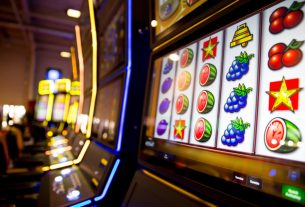Slot games have become a ubiquitous presence in the world of online and offline gambling. From the glitz and glamour of Las Vegas casinos to the convenience of mobile apps, slot machines continue to captivate players with their colorful themes, catchy sound effects, and the promise of big wins. But beyond the flashing lights and spinning reels lies a complex mathematical framework that determines the odds of winning. In this article, we’ll delve into the intricate world of slot game math, shedding light on the probabilities that govern every spin.
The Intriguing World of Slot Game Mathematics
At the heart of every slot machine is a random number generator (RNG), a sophisticated algorithm that generates thousands of random outcomes per second. These outcomes determine the symbols that appear on the reels, dictating whether a player wins or loses on each spin. Understanding how this RNG works is crucial for grasping the odds of winning in slot games.

In today’s fast-paced gambling landscape, players often seek out slot gacor hari ini performing well and yielding frequent payouts. While it’s tempting to believe in hot streaks or lucky machines, the reality is that each spin is independent of the previous one, and there’s no guaranteed strategy for predicting when a slot will pay out.
Deciphering the Paytable: Symbols, Payouts, and Odds
One of the first steps in understanding slot game math is examining the paytable, which outlines the various symbols and their corresponding payouts. Symbols are weighted differently, with some appearing more frequently than others. By analyzing the paytable, players can gain insights into the odds of landing winning combinations and calculate the expected return on their bets.
RTP and Volatility: Key Metrics for Assessing Slot Game Odds
Two important metrics for evaluating slot game odds are RTP (Return to Player) and volatility. RTP represents the percentage of wagered money that a slot machine pays back to players over time, with higher RTP values indicating better odds for the player. Volatility, on the other hand, refers to the risk associated with playing a particular slot – low volatility slots offer frequent but small wins, while high volatility slots yield larger payouts but less frequently.
Maximizing Winnings: Tips for Playing Smarter
While slot games are largely based on luck, there are some strategies that players can employ to maximize their winnings. Setting a budget, choosing games with favorable RTP rates, and understanding the mechanics of different slots can all improve the odds of walking away with a profit. However, it’s essential to remember that gambling should always be approached responsibly, and there’s no foolproof method for guaranteeing success.

Conclusion
In the realm of slot game math, understanding the odds is key to making informed decisions and enhancing the gaming experience. While the allure of big jackpots and exciting gameplay can be enticing, it’s important for players to recognize the underlying mathematics that govern every spin. By familiarizing themselves with concepts like RNG, paytables, RTP, and volatility, players can embark on a journey of discovery that enhances both their enjoyment and their chances of winning.


